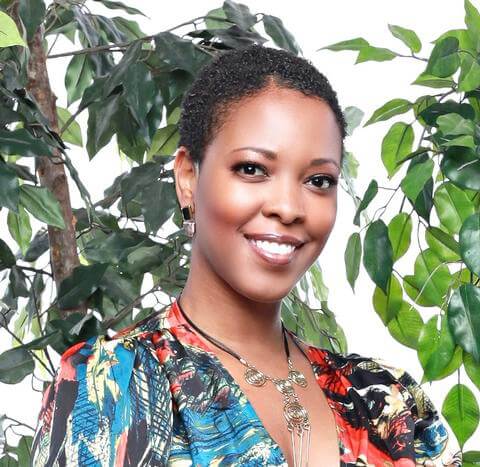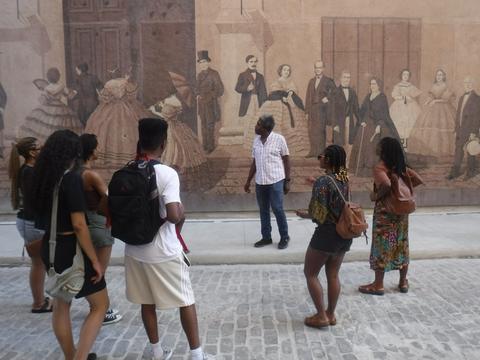Bison Trailblazers | Cuban Study Abroad Impacts Doctoral Studies
by Imani Cabassa-George
Have you ever pictured yourself in a different country, learning the culture, exploring the cuisine, and meeting new people? Studying abroad is a once-in-a-lifetime opportunity that offers those very experiences. For doctoral student Geneva Greene, her time in Cuba last year, also impacted her research and career goals.
Originally from Atlanta, Georgia, Greene is a third year PhD student in the Communication, Culture, and Media Studies program. Her research focuses primarily on transnational communications, exploring how people of the African diaspora communicate across the Americas and the Caribbean.
Greene sat down with The Sway to discuss her study abroad experiences. This interview has been edited for clarity.
The Sway (TS): How did you hear about the alternative break/study abroad program?
Geneva Greene (GG): Communication is an interdisciplinary field. I intentionally reached out to professors across the university whose work connected with my research interests. Through my outreach, I crossed paths with (then Howard) Spanish language professor Dr. Aisha Cort in the World Languages and Cultures Department. When I mentioned my interest in Cuba, she shared that she planned to take a group of students to the country during spring break. We stayed in contact. When the time arrived, I applied to join the group and was accepted.
TS: What made you choose to study abroad as a grad student? Have you ever studied abroad as an undergraduate? Were there differences in your experiences?
GG: Visiting Cuba has been a long-standing dream of mine. I studied Latin American history, literature, culture, and language throughout high school and college. Colombia was the first country I visited outside of the United States. I traveled there and stayed with a Colombian friend's family. Later, I studied in Brazil through my MBA program. However, Cuba has always been one of the most fascinating countries to me. I was not sure if visiting there was possible due to the United States’ political relations with the country. When the opportunity arose to visit, I did not think twice about it. There were seven of us who traveled with Dr. Aisha Cort, who also happens to be Cuban. I was the only graduate student, among the group. I had a fabulous time. The trip was focused entirely on Afro-Cuban experiences outside of traditional tourist experiences thanks to our local tour guide. In my opinion, that is the best way to explore.
TS: Tell us about any significant experiences in Cuba.
GG: We were immersed in Afro-Cuban studies, including a focus each day on topics such as rebellion and Black resistance, race and climate change, healing, dance, music and poetry, and identity. We toured Old Havana, learning about Afro-Cuban history from renowned Cuban journalist and scholar Roberto Zurbano. He emphasized the fight to acknowledge the history and the important role hip-hop played in preserving this past. We were led by Cuban hip-hop pioneer Alexey Rodriguez. Race and the environment also arose as a dominant theme throughout our visit. We visited an amazing urban farm, Rincon del Cristo, which was established on a former garbage dump hill. The lead farmer walked us around the farm, pointing out fruits, vegetables, and herbs. He discussed the land’s deep connection to African and indigenous practices. However, similar to the United States, environmental racism disconnects people from the land and keeps them in deeply dilapidated communities. African traditional religion weaved a thread through every conversation. It was so fascinating to visit a place where African traditional religion noticeably prevailed.
We also met with Deputy Chief of Public Affairs Xavier Billingsley at the U.S. Embassy. He emphasized the vital roles that African American culture and Afro-Cuban culture play in diplomatic relations.
TS: What did you get out of your study abroad experience? Were you able to conduct any research or pursue any other academic interests?
GG: My research explores dance communication. I experienced rumba and salsa firsthand while in Cuba. I also learned about the music and spiritual significance that accompanies the dance. Following the trip, I began publishing a three-part blog series on Medium highlighting my reflections. Additionally, I published work in the Journal of Black Studies with my colleague Raul Candelaraia entitled: “Framing Cuba: U.S. Media and Cuba’s Black Lives Matter Protests.”
TS: What advice would you give to other graduate students who might be interested in studying abroad?
GG: Just do it. Life will always present obstacles and distractions. However, during your time at Howard, prioritize exploring all opportunities as a student. You can shape your graduate experience in whatever way you like. Talk to others and learn more about the possibilities. Dream. Then, take the steps to make those dreams a reality.
TS: What was one unique thing you learned while in Cuba?
GG: We met with many Afro-Cuban women entrepreneurs during our visit. Challenges exist with being an entrepreneur. Those challenges multiply for women and people of African descent in a Communist country. Despite the odds and obstacles, the women and their families persevere, turning trials into triumphs. We would categorize their businesses as having a social impact - for them economic success is tied to uplifting and empowering their communities - through fashion or hair care. They found ways to leverage generational talents into global businesses using the byproducts from other industries. They boldly fight against discrimination in their country. Zulu Bolsos, for example, makes beautiful bags from leather pieces. Poet Teresa Cardenas cannot sell her books in her country because they discuss her experiences as a Black woman, yet she persists and ventures to other countries such as Brazil. To combat a disdain for tightly coiled hair, two women started a natural hair beauty pageant, began making hair products, and teaching hair care. I continue to be inspired by the resourcefulness and activism of Afro-Cuban women.
TS: How has studying abroad impacted your academic journey?
GG: Studying in Cuba profoundly enriched my academic journey. I made lifelong connections. I love walking across campus, crossing paths with my undergrad colleagues, and cheering them on in their life pursuits. My academic community is amplified and strengthened through the trip. My research perspective was magnified because I did not solely read about the country and people; I experienced and related to them. I was able to share some of my new resources with others who share my research interests.
TS: Share one place that you would love to visit on another study abroad.
GG: I would love to return to Brazil. I traveled there during my MBA, but we did not venture into any Afro-Brazilian spaces. I want to travel to Bahia, Brazil, to spend time with my people. I am already working on this trip. I recently connected with a research colleague during a conference who travels there annually and takes a group.
(Photos on Flickr used by permission from Geneva Greene.)


